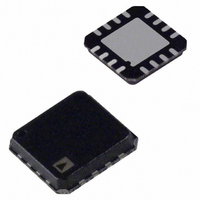AD8305ACPZ-RL7 Analog Devices Inc, AD8305ACPZ-RL7 Datasheet - Page 14

AD8305ACPZ-RL7
Manufacturer Part Number
AD8305ACPZ-RL7
Description
IC, LOGARITHMIC AMP, 20mV, LFCSP-16
Manufacturer
Analog Devices Inc
Type
Logarithmic Converterr
Datasheet
1.AD8305ACPZ-RL7.pdf
(24 pages)
Specifications of AD8305ACPZ-RL7
No. Of Amplifiers
1
Dynamic Range, Decades
5
Scale Factor V / Decade
0.2
Supply Voltage Range
3V To 12V
Amplifier Case Style
LFCSP
Supply Current
5.4mA
Input Offset Voltage
20mV
Design Resources
Interfacing ADL5315 to Translinear Logarithmic Amplifier (CN0056) Interfacing ADL5317 High Side Current Mirror to a Translinear Logarithmic Amplifier in an Avalanche Photodiode Power Detector
Applications
Fiber Optics
Mounting Type
Surface Mount
Package / Case
16-LFCSP
Rohs Compliant
Yes
Number Of Channels
1
Number Of Elements
3
Power Supply Requirement
Single/Dual
Single Supply Voltage (typ)
5V
Dual Supply Voltage (typ)
±3/±5V
Power Dissipation
500mW
Rail/rail I/o Type
Rail to Rail Output
Single Supply Voltage (min)
3V
Single Supply Voltage (max)
12V
Dual Supply Voltage (min)
±1.5V
Dual Supply Voltage (max)
±6V
Operating Temp Range
-40C to 85C
Operating Temperature Classification
Industrial
Mounting
Surface Mount
Pin Count
16
Package Type
LFCSP EP
Lead Free Status / RoHS Status
Lead free / RoHS Compliant
Lead Free Status / RoHS Status
Lead free / RoHS Compliant, Lead free / RoHS Compliant
Other names
AD8305ACPZ-RL7
AD8305
APPLICATIONS
The AD8305 is easy to use in optical supervisory systems and in
similar situations where a wide ranging current is to be
converted to its logarithmic equivalent, which is represented in
decibel terms. Basic connections for measuring a single-current
input are shown in Figure 35, which also includes various
nonessential components.
The 2 V difference in voltage between the VREF and INPT pins
in conjunction with the external 200 kΩ resistor R
reference current, I
VRDZ to VREF raises the voltage at VLOG by 0.8 V, effectively
lowering the intercept current, I
position it at 1 nA. A wide range of other values for I
under 100 nA to over 1 mA, may be used. The effect of such
changes is shown in Figure 5.
Any temperature variation in R
when estimating the stability of the intercept. Also, the overall
noise increases when using very low values of I
intercept applications, there is little benefit in using a large
reference current, since this only compresses the low current
end of the dynamic range when operated from a single supply,
here shown as 5 V. The capacitor between VSUM and ground is
recommended to minimize the noise on this node and to help
provide a clean reference current.
1kΩ
V
200kΩ
BIAS
1nF
I
PD
VRDZ
VREF
VSUM
1kΩ
IREF
1nF
INPT
Figure 35. Basic Connections for Fixed Intercept Use
1nF
0.5V
0.5V
REF
20kΩ
, of 10 μA into Pin IREF. Connecting pin
COMM
VNEG
Q2
Q1
80kΩ
–
+
V
V
2.5V
VPOS
BE2
BE1
REF
INTC
COMPENSATION
TEMPERATURE
+5V
must be taken into account
, by a factor of 104 to
GENERATOR
BIAS
COMM
14.2kΩ
6.69kΩ
I
LOG
0.5 log
REF
451Ω
COMM
. In fixed
VOUT
SCAL
REF
BFIN
10
REF
provide a
1nA
I
PD
, from
12kΩ
8kΩ
VLOG
10nF
C
FLT
Rev. B | Page 14 of 24
Because the basic scaling at VLOG is 0.2 V/decade, and a swing
of 4 V at the buffer output would correspond to 20 decades, it is
often useful to raise the slope to make better use of the rail-to- rail
voltage range. For illustrative purposes, the circuit in Figure 35
provides an overall slope of 0.5 V/ decade (25 mV/dB). Thus,
using I
at I
corresponding to a dynamic range of 120 dB (electrical, that is,
60 dB optical power).
The optional capacitor from VLOG to ground forms a single-
pole low-pass filter in combination with the 4.55 kΩ resistance
at this pin. For example, using a C
frequency is 3.5 kHz. Such filtering is useful in minimizing the
output noise, particularly when I
more effective in reducing the total noise; examples are provided in
the
The dynamic response of this overall input system is influenced
by the external RC networks connected from the two inputs
(INPT, IREF) to ground. These are required to stabilize the
input systems over the full current range. The bandwidth
changes with the input current due to the widely varying pole
frequency. The RC network adds a zero to the input system to
ensure stability over the full range of input current levels. The
network values shown in Figure 35 usually suffice, but some
experimentation may be necessary when the photodiode
capacitance is high.
Although the two current inputs are similar, some care is
needed to operate the reference input at extremes of current
(<100 nA) and temperature (<0°C). Modifying the RC network
to 4.7 nF and 2 kΩ is recommended for measuring 10 nA at
−40°C. By inspecting the transient response to perturbations in
I
adjusted to provide fast rise and fall times with acceptable
settling. To fine tune the network zero, the resistor value should be
adjusted.
REF
PD
AD8304
at representative current levels, the capacitor value can be
= 1 mA while the buffer output runs from 0.5 V to 3.5 V,
REF
= 10 μA, V
data sheet.
LOG
runs from 0.2 V at I
PD
FLT
is small. Multipole filters are
of 10 nF, the −3 dB corner
PD
= 10 nA to 1.4 V














